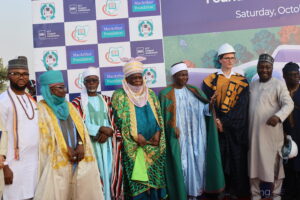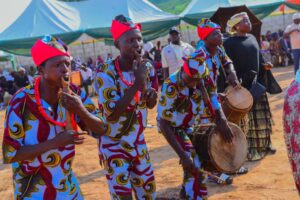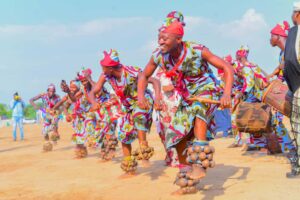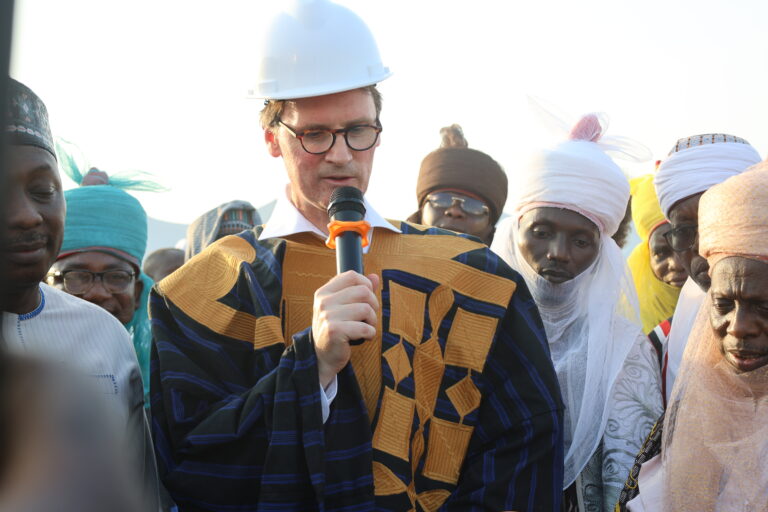The European Union (EU) and MacArthur Foundation have restated their commitment to protecting the cultural identity and rights of Abuja’s Original Inhabitants, as the Resource Centre for Human Rights and Civic Education (CHRICED) laid the foundation of the Abuja Cultural Heritage Centre.
The event, held at the weekend at the University of Abuja, brought together traditional rulers, development partners and civic advocates seeking justice and recognition for the nine tribes indigenous to the Federal Capital Territory (FCT).
Performing the groundbreaking ceremony, Prof. John Palfrey, President of the MacArthur Foundation, said the Foundation was proud to back a project that honours the history and resilience of Abuja’s first people.
Palfrey said the Foundation’s long presence in Abuja compelled it to contribute to efforts that honour the city’s first people. He noted that the Heritage Centre would preserve history, protect identity and offer Nigerians in the diaspora a place to reconnect with their origins.
According to him, MacArthur hoped the Centre would evolve into a globally recognized hub for culture and community memory.

READ ALSO: CHRICED, FCT Indigenous Groups Demand Justice At Media Colloquium
“We have been in Abuja for about 25 years and we ask ourselves: how can we be good guests? Supporting this Centre is part of preserving the cultural heritage of the Original Inhabitants,” he said.
“We hope it grows into a global institution that honours the concept of home and connects Nigerians in the diaspora to their roots.”
He commended CHRICED for its sustained initiatives aimed at empowering and uplifting Abuja’s Original Inhabitants in the federal capital territory, Abuja.
Also speaking, Gautier Mignot, the EU Delegation to Nigeria and ECOWAS, said the Union would strengthen cultural interventions, having seen the importance of the project.
Represented by Mr. Massimo De Luca, the EU Delegation said “We support scholarships and innovation at the University of Abuja, but culture must get more attention.
“There are opportunities in museum education, indigenous architecture and festivals that should be expanded and we also remain committed to human rights and happy to celebrate with you,” he noted.
Chairman of the occasion and Sarki Karshi, HRH Ismaila Danladi Mohammed, said the Centre would serve as a reminder that the struggle of the Indigenous People is not local, but universal.

“This is a powerful statement to our global relevance. Our history must not be forgotten. The Centre will be where our youths learn their roots and where indigenous voices influence policy,” he said.
The Africa Director of the MacArthur Foundation, Dr. Kole Ahmed Shettima, said the initiative aligns with the organisation’s belief in being “good neighbours” after decades of work in the FCT.
On his part, Dr. Ibrahim M. Zikirullahi, Executive Director of CHRICED, said the Centre would stand as a bridge between culture and citizenship, ensuring that the rights of Original Inhabitants become central to national identity and governance.
“Culture is the soul of a people; democracy is the voice of that soul. When culture is recognised, democracy thrives,” he said. “This Centre is not just a museum — it is an institution of justice.”
Zikirullahi said the Centre reinforces the principle that democracy thrives only when people’s heritage and identity are protected. According to the organisation, the right to culture and inclusion is directly linked to the right to citizenship in any democratic society.
READ ALSO: Abuja Comes Alive as CHRICED, FCT Natives Mark Indigenous Day in Style
The Heritage Centre, he added, is designed to serve as a bridge between tradition and modern governance. It will host research initiatives, cultural dialogue and civic engagement programmes aimed at strengthening democracy through indigenous knowledge.
While acknowledging the historic injustices faced by Abuja’s Original Inhabitants, CHRICED Executive Director noted that Nigeria’s cultural influence continues to grow globally through music, film, fashion and cuisine. He however stressed that national recognition must begin at home with justice for local communities.
According to him, the Centre is also expected to correct long-held narratives that described Abuja as a “virgin land,” despite being home to nine distinct indigenous tribes long before the capital city was established.
He expressed appreciation to the MacArthur Foundation for supporting the project, stating that its investment would continue to empower citizens to advocate for accountability and inclusive governance.
Zikirullahi also commended the University of Abuja for hosting the Centre, describing the collaboration between academia and civil society as a model capable of driving lasting reforms.
He further celebrated the resilience of Abuja’s Original Inhabitants, saying their decades-long campaign for recognition had turned “displacement into determination” and would serve as the foundation of the new Centre.

Prof. Mathew Adamu, Acting Vice-Chancellor of the University of Abuja, commended Resource Centre for Human Rights and Civic Education (CHRICED) for transforming the site ahead of the groundbreaking in record time and expressed hope that the Centre will become a valuable hub for academic research and cultural engagement.
READ ALSO: Mass Retirement Looms In Military Hierarchy After Tinubu Major Shake-Up
On her part, Head of DPS Misereor, Julia Krojer, congratulated CHRICED and the Original Inhabitants of Abuja on the groundbreaking of the Heritage Centre, describing it as the foundation of a lasting legacy for indigenous communities in the Federal Capital Territory.
She said the Centre would preserve languages, traditions and values that form the cultural heartbeat of the nation’s capital, ensuring they are passed on to future generations. Krojer noted that the project reflects a strong commitment to inclusion and cultural recognition, emphasising that development must respect identity and heritage.
At the historical event, guests were treated to displays of rich FCT heritage, including traditional drumming, masquerade performances and a cultural exhibition showcasing the legacy the Centre aims to protect.

